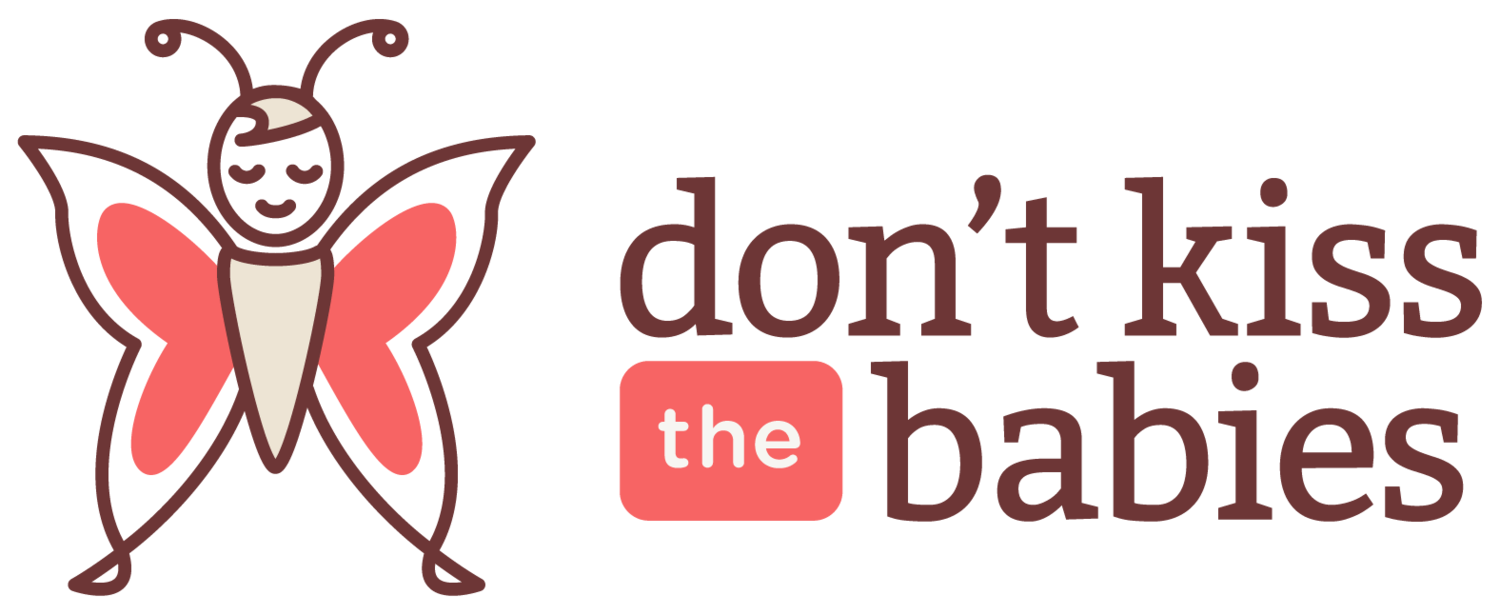
DKTB is here to help support parents and loved ones spread our message in a firm, yet positive and loving way
Answering questions or speaking up aren’t always easy. Sometimes it’s difficult to tell a loved one why we don’t want them kissing our new baby or even be around at all for a period of time. We’re here to help with that.
Below you’ll find some FAQs and other helpful hints to help in these and similar situations.
Q: “Is it safe for family or friends to kiss our baby?”
A: No. This is a difficult one as many times, family members and/or friends don’t ask permission, but instead go ahead and start kissing our baby all over their face, head or hands. This presents a very awkward situation for us as parents who are doing our best to keep our child healthy and safe as their immune system develops.
It’s best to encourage family members to save those kisses for later when baby is less susceptible to illness.
Q: “How can I explain these things to my older child or children who are wanting to kiss and snuggle our baby?”
It’s important to have these conversations with your child/children from the beginning. Discussing the safety and health of your newborn baby with them before he/she is even born can be very helpful.
It’s only natural for our children to have a special bond. Siblings are a wonderful thing and it’s important to help your older child/children understand the balance between keeping their new sibling safe and showing them love and affection.
Any of the following ideas are great ways that your baby’s siblings can show how much they love him/her:
Having your child/children create or make things for your new baby such as ribbons, flags, pictures, artwork and hanging them in baby’s room
Taking pictures with or near baby
Holding baby only after washing their hands
NOT holding or touching baby if they display any symptoms of illness or have been around anyone who has been sick
Helping change baby’s diaper
Feeding baby (after washing hands)
Singing or reading to baby
Giving toys or pacifier to baby (after washing hands)
Q: “What do I say to family members or friends who are kissing or want to kiss our baby?”
This can be one of the most challenging things that new parents face. Those well-meaning loved ones of ours truly do mean well and intend no harm. It’s so important to speak up for your baby; to be their voice. Even if no one is displaying any symptoms of illness, it’s still incredibly important to adhere to this for the safety and health of your baby.
A gentle, but firm reminder is great. Saying things like:
“Oh, I’m sorry. We’d really prefer if you didn’t kiss him/her.”
“It’s so great that you love him/her so much, but we would appreciate you saving those kisses for a time when he/she is less susceptible to getting sick.”
Q: “What should we do or say in situations when strangers or random people get too close to our baby?”
People love babies, and getting close to see their cuteness is inevitable. But, it’s important to make sure you are putting your child’s safety above all else.
Say you’re at the grocery store, at your child’s soccer game or out for a family walk. Your child is in his/her car seat carrier or stroller. Then, it happens. A stranger approaches and gets far too close to your new baby. They may even try to reach in and touch them. These instances are most often from kind, well-meaning people who just “can’t help themselves”.
However, it is so important to make your stance known. Any of the following things are examples of effective things to say in these situations:
“Excuse me, could you please back up? We would appreciate you admiring him/her from a safe distance instead.”
“Please do not touch him/her. We know he/she is cute, but he/she is very susceptible to germs and potential illness right now.”
“We don’t mean to be rude, but we are uncomfortable with you touching him/her."
Q: “What should we do or say if family members or friends want to come visit our baby?”
It’s important to always do what you are comfortable with and to consider what is best for your baby. It’s also important to consider your own mental health during a time of significant adjustment. We recognize that it can helpful to have others around after bringing a new baby home. If you feel comfortable allowing family and friends into your home, it’s important that they take the necessary safety precautions to keep your new baby safe. Visit our “Know the Facts” page for more information on these precautions.
On the contrary, if you are firm about others keeping their distance for those first 6-8 weeks of your baby’s life, it is important to speak up. Those conversations can be difficult. In those situations, we strongly encourage you to direct family, friends and others to our organization.
Saying the following things can be helpful in explaining your decision to friends and family:
“We are so thankful that you want to be a part of his/her life. We are going to take some time to get settled and we will let you know when we are ready for visitors.”
“We know you want to come visit and see how cute he/she is and we would love that. However, we are making sure to keep him/her extra safe during these first 6-8 weeks because he/she is extra susceptible to getting sick.”
“We know how much you love him/her and he/she loves you too. We want to make sure that he/she stays healthy during these first 6-8 weeks as his/her immune system develops.”


